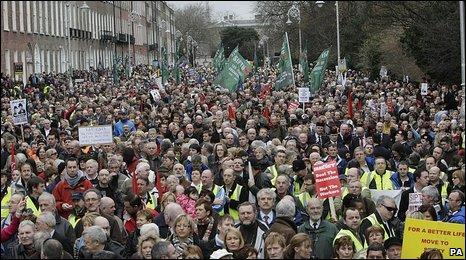We are all in this together?

We are not all in this together because we never were. By Michael Cronin.
In 2007 the richest 1% of the population owned 34% of the wealth. In October 2010 the economist Tom O'Connor estimated that the total net worth of 33,000 Irish millionaires was €121 billion. In a society already characterised by stark levels of inequality, the budgetary cuts will make the social fracture even greater. Sharing the pain is a misnomer in that effects of cuts to those on low incomes and social welfare in a dramatically unequal society are proportionately greater that cuts in a more equal society. When the starting point is not the same, the finishing line cannot be either.
In 2007 the average pay of CEOs in 21 of the largest private companies in Ireland was €1.1 million and this rose to €1.6 million in 2009. In 2009 Irish CEOs were paid over 136 times the level of income for those at risk of poverty (income of approximately €11,000 a year). It is in this context that the most vulnerable sections of the society will be made to receive even less than they did before. It is clear that 'We' is the most abused pronoun in Irish political language. There is such a thing as society but there is no such thing as a 'we' which pretends in the name of collective interest to destroy those very things – health, education, equal opportunity – which hold a society together.
Another fictional version of we are all in this together is the national interest. The fig leaf of patriotism is produced to hide the indecency of elite self interest. The banks, financial institutions and property developers who pursued a relentless and cynical policy of self-enrichment were not in any way concerned with the national interest. Yet, taxpayers are now being asked in the national interest to bail out those whose actions and behaviour showed a reckless disregard for the interests of the nation. Furthermore, taxpayers are being asked to act in the national interest by those politicians and corporate pundits who signally failed to take any cognisance of the national interest in their repeated failure to regulate the dangerous excesses of elite groups in finance, property and the professions. A genuine sense of the national interest means challenging the assault on the poor and the destruction of civil society as deeply inimical to the interests of the vast majority of inhabitants living on the island. A genuine sense of the national interest means a refusal to be beholden to the predatory practices of foreign financial markets and their domestic cheerleaders in the academy and the media.
We are not all in this together when rising inequality, the weakening of social solidarity and the privileging of privatised responses to social needs place the protection and promotion of minority interests at the heart of social, political and economic policy. We are not all in this together because citizens should not be held accountable for the problems that were not of their own making. The transfer of responsibility for reckless political and financial mismanagement to those sections of the population that politically and materially have had no say in the political and economic running of the country is cynical, dangerous and callous. Pain inflicted on the innocent is one definition of crime. Now is the time to stop the crimes being committed in our name, in the name of a 'we' that finds 'this' politically, economically and socially unacceptable.
Michael Cronin is Director of the Centre for Translation and Textual Studies, Dublin City University, and co-editor of the Irish Review.
